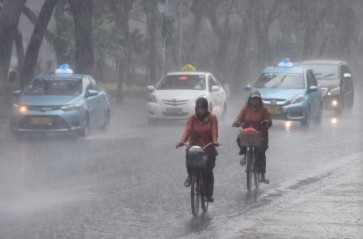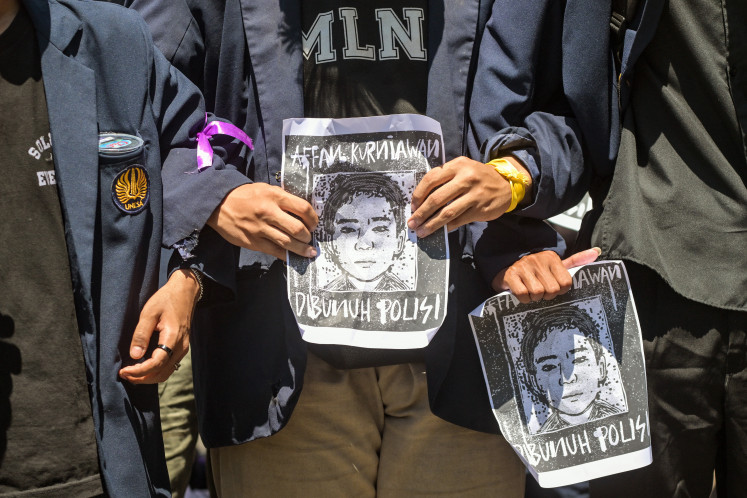Popular Reads
Top Results
Can't find what you're looking for?
View all search resultsPopular Reads
Top Results
Can't find what you're looking for?
View all search resultsMK allows indigenous people to cultivate forests
The Constitutional Court (MK) has granted a petition to allow indigenous people to cultivate forests for their living in the 1999 Forestry Law, while it rejected requests to strengthen measures against deforestation
Change text size
Gift Premium Articles
to Anyone
T
he Constitutional Court (MK) has granted a petition to allow indigenous people to cultivate forests for their living in the 1999 Forestry Law, while it rejected requests to strengthen measures against deforestation.
Constitutional Court deputy chief justice Anwar Usman said the panel of judges maintained articles in the law that generally prohibit people from cutting down trees or herding in forests without special permits, but ordered the exclusion of indigenous people.
'The propositions on Article 50 Paragraph 3e and 3i of Law No. 41/1999 on forestry are partly reasonable,' he said while reading the verdict at the court in Central Jakarta on Thursday.
Article 50 Paragraph 3e forbids the cutting down of trees or cultivating of forestry produces inside forest areas without permits from the authorities, while Paragraph 3f bans herding inside forest areas that are not designated specifically for that purpose by the authorities.
According to Judge Manahan MP Sitompul, the restrictions imposed by the law should not apply to people who have lived from generation to generation in forest areas and sustain their lives by cutting trees for non-commercial purposes.
Therefore, indigenous people who met the description could not be criminalized, as doing so would create a paradox in which the government acknowledged indigenous people's rights on the one hand, but at the same time threatened them with the Forestry Law, he added.
The government should protect them instead, Manahan said.
'Therefore, the requests filed by the plaintiffs in regard to the exemption of indigenous people are reasonable, as long as they apply to people who have been living from generation to generation inside forest areas, not around them, because 'around forest areas' is very different from people who live inside the forest,' he said.
Besides cultivating the forests, indigenous people were also allowed to herd inside forest areas without permits.
'The reasoning behind Paragraph 3e also applies to Paragraph 3i, as long as the herding is part of daily necessities for people who have lived from generation to generation inside forest areas,' said Manahan.
For those reasons, the panel of judges said, both items violated the Constitution and thus were not legally binding unless indigenous people were exempted from them.
The judicial review had been filed by a group of farmers and environmental NGOs last year.
According to Andi Muttaqin, an advocate with Public Interest Lawyer Network (PIL-Net), a group of lawyers who give free services to marginalized people, the verdict was marred with irregularities, because the panel of judges only approved a small part of the requests.
As for other requests, the judges believed they were not clear enough and did not have a sufficiently strong legal basis for the court to approve them.
'There were two laws [for which we filed requests], the Forestry Law and Law No. 18/2013 on forest destruction, prevention and eradication [P3H],' he said after the verdict. 'We think it is strange that the court did not take into account the arguments from experts and witnesses during the court proceedings on the P3H Law.'
Andi, however, appreciated the court's decision to approve the judicial review on Article 50 of the Forestry Law. 'In the past, criminalization of indigenous people was common. These articles were often used to criminalize people. Even someone who just passed through a forest could be sent to prison,' he said.
Indonesian Forum for the Environment (Walhi) legal defense and policy manager Muhnur Satyahaprabu, meanwhile, said he would file another judicial review, as the verdict was deemed insufficient to ensure that indigenous people would not be criminalized.
'The verdict does not provide the justice that we seek,' he said on Thursday. 'Even though the court approved the Article 50 [review], it cannot be implemented, because how will we identify people who live in forest areas? Most people who used to live in forest areas have been kicked out of the forests by plantation firms or the state. In Java, there are practically no more people living in the forests, because they have been kicked out by state-owned forestry firm Perhutani.'
______________________________________
To receive comprehensive and earlier access to The Jakarta Post print edition, please subscribe to our epaper through iOS' iTunes, Android's Google Play, Blackberry World or Microsoft's Windows Store. Subscription includes free daily editions of The Nation, The Star Malaysia, the Philippine Daily Inquirer and Asia News.
For print subscription, please contact our call center at (+6221) 5360014 or subscription@thejakartapost.com










